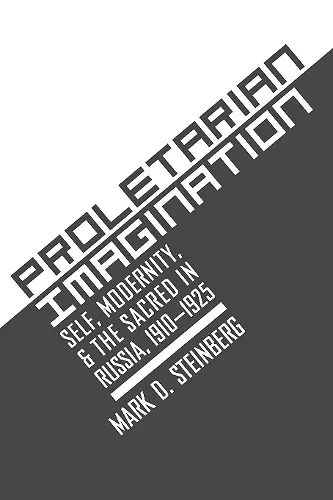Proletarian Imagination
Self, Modernity, and the Sacred in Russia, 1910–1925
Format:Paperback
Publisher:Cornell University Press
Published:18th Sep '02
Currently unavailable, and unfortunately no date known when it will be back
This paperback is available in another edition too:
- Hardback£108.00(9780801440052)

In fin-de-siècle and early revolutionary Russia, a group of self-educated workers produced a large body of poetry and prose in which they attempted to comprehend their rapidly changing world. Witnesses to wars and revolution, these men and women grappled on paper with the nature of civilization and the imperatives of ethical truth. In a strikingly original approach to Russian culture, Mark D. Steinberg listens to their words, which are little known today. The results of their literary creativity, he finds, were frequently not what the new Soviet order was expecting from its workers, despite its celebration of the notion of a proletarian art.Through insightful readings of a vast fund of lower-class writings, Steinberg shows that the authors focused above all on the uncertain nature and place of the self, the promise and dangers of modernity, and the qualities of the sacred in both their lives and their imaginations. Like their counterparts in the intelligentsia, these worker writers were ambivalent about Marxist ideology's celebration of the city and the factory and even about modern progress itself. Drawing on vast research, Steinberg demonstrates the texts' significance for an understanding of Russian popular mentalities, indeed for the very meaning, philosophically and morally, of these years of crisis and possibility at the end of the old order and the early years of the Soviet regime.
Anyone who thinks of 'the proletarian imagination' as a dull topic about which everything has already been said by Marxist critics will be astonished by the range and depth of topics Steinberg engages in his study of Russian worker writers during the intellectually and politically turbulent decades after the 1905 revolution.... One of the many virtues of Proletarian Imagination is Steinberg's contextualization, without condescension to less-gifted authors, of the work of the most acclaimed proletarian writer, Andrei Platonov. Summing Up: Highly recommended. Upper-division undergraduates through faculty.
-- M. G. Levine, UNC-Chapel Hill * Choice *Deftly interweaving literary analysis with social history, Steinberg suggests that workers understood their position in the modern city through a moral language about human rights and dignity; they understood their destiny through a quasi-Christian vision of revolutionary salvation, as articulated by a wide range of proletarian writers and poets.
-- Orlando Figes, Birkbeck College, University of London * Slavic Review *Mark D. Steinberg speaks to two issues in Russian cultural history in this important book: the relationship between high and low culture and the modernity of the lower classes.... This is a fine book from which scholars can learn much about Russian social life, culture, and the literary tradition.
-- Jeffrey Brooks, Johns Hopkins University * American Historical Review *Mark Steinberg has presented us with a detailed and subtle social history of early proletarian literature in Russia. The contours of these often tortured attempts as self-expression by semi-educated workers, along with their many contradictions and inner tensions, have seldom been laid out with such care and evident respect. This, along with the meticulous referencing of source material, will make Steinberg's book a valuable resource for cultural historians and literary scholars for some time to come.
-- Craig Brandist * Slavonic and East European Review *Proletarian Imagination makes its presentation clearly and concisely. It is a thoroughly researched study.... It also has an extensive appendix, containing seventeen fascinating and very useful biographical sketches or writers discussed in the text.
-- Dennis Reinhartz, University of Texas at Arlington * History: Review of New Books *Steinberg's book is a complex meditation on 'the modern' as perceived through the writings of an atypical group of workers. In search of an objective 'truth' they could embrace, these authors instead articulated an unsettling ambivalence. These were not the convictions that Bolsheviks wished for in their talented worker-intellectuals, particularly as the Revolution failed to resolve the dilemmas of mind-numbing factory labor or the depravity of the modern city. Nor were these the convictions that generations of observers ascribed to workers. Steinberg thus continues an historiographical trend that complicates any singular conception of proletarian Russia.
-- Heather Hogan, Oberlin College * The Russian ReviISBN: 9780801488269
Dimensions: 235mm x 155mm x 21mm
Weight: 907g
352 pages